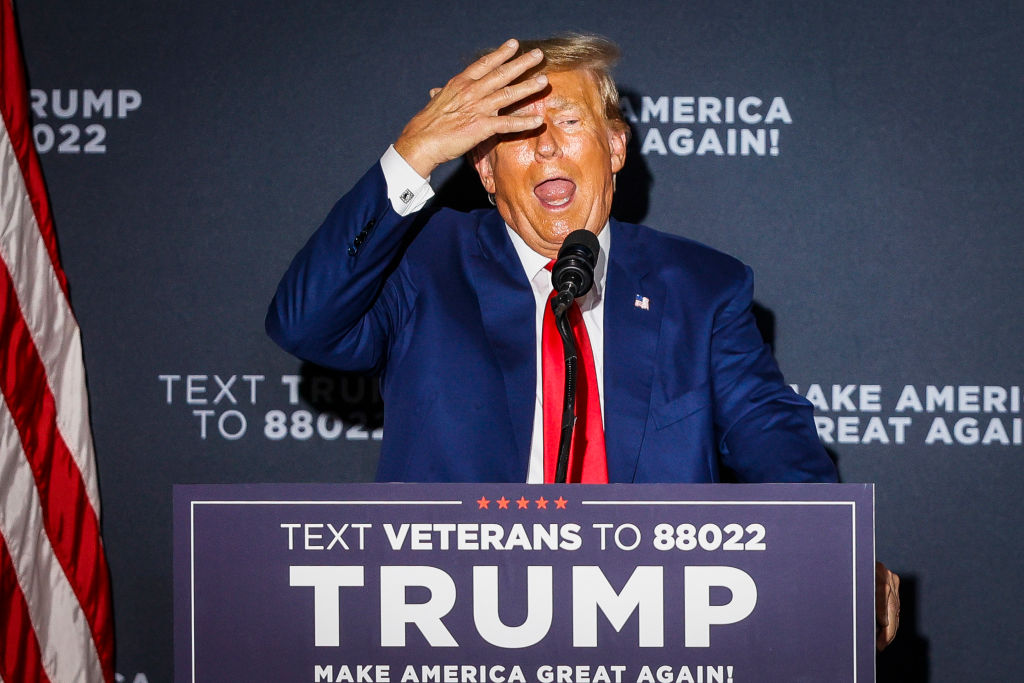Happy Wednesday! For the first time in history, according to Nielsen data, linear television accounted for less than 50 percent of Americans’ total viewing time in July—with cable TV accounting for 29.6 percent and broadcast TV 20 percent.
The other 50.4 percent? This YouTube video of a pug eating watermelon.
Quick Hits: Today’s Top Stories
- Federal prosecutors in a court filing yesterday denied recent allegations made by Hunter Biden’s legal team that prosecutors had “reneged” on a plea deal with their client, arguing that “the two proposed agreements were drafts that either party could propose changes to.” The lawyer who represented Hunter Biden in negotiating his plea deal with the Justice Department over alleged tax and gun offenses also stepped down Tuesday and vowed to testify as a witness on behalf of the president’s son in an attempt to save the plea deal which fell apart in court last month.
- Charles McGonigal, a former high-ranking FBI agent, pleaded guilty on Tuesday to helping a sanctioned Russian oligarch in exchange for secret payments. Formerly the top agent at the FBI’s New York counterintelligence office, McGonigal now faces a maximum of five years in prison—rather than the 20 years he could have faced had he not admitted to accepting $17,500 from Russian oligarch Oleg Deripaska.
- President Joe Biden said on Tuesday that he and Jill Biden will travel to Hawaii “as soon as we can” to survey damage in the aftermath of wildfires which have killed at least 99 people on Maui. Biden declared a federal emergency and issued a statement expressing his condolences for the lives lost last week, but has faced criticism from Republicans who argue he has not adequately addressed the tragedy.
- A federal judge on Monday dismissed a lawsuit brought by the libertarian Cato Institute and other free market groups that had aimed to block the Biden administration’s latest student loan forgiveness push. The decision is a win for Biden, who announced changes to income-driven repayment plans last month in an effort to cancel debt for more than 800,000 borrowers after the Supreme Court struck down a more ambitious loan forgiveness program.
- Chinese officials will no longer share data on the country’s youth unemployment rate, which has spiked in recent months, Beijing announced yesterday. China has recently attempted to restrict economic data as its economy spirals; the country’s central bank also unexpectedly cut key interest rates in an attempt to spur growth.
- Retail spending in the U.S. grew at the fastest pace since the start of 2023 last month, according to new data released by the Commerce Department yesterday. Sales in the retail sector rose a seasonally-adjusted 0.7 percent from June, picking up from a 0.3 percent gain the prior month and outpacing July’s 0.2 percent increase in consumer prices. The data signal that consumer spending remains strong even as the Federal Reserve attempts to cool the economy with higher interest rates.
- The Nevada Republican party announced Monday that it will hold a presidential caucus on February 8, 2024, jumping ahead of South Carolina’s February 24 primary. The party’s decision defies Nevada’s state legislature, which in 2021 passed a law requiring a state-run primary, currently scheduled for February 6; the state GOP has maintained that it will allot delegates through its caucus, rather than the preceding primary.
Trump and 18 Co-Defendants Indicted in Georgia

What do former President Donald Trump, Young Thug, and Kanye West’s onetime publicist have in common? They’re all facing racketeering charges from Fani Willis, the Democratic district attorney in Fulton County, Georgia.
Trump was hit with his fourth and most expansive indictment Monday, this time for his attempts to overturn the 2020 presidential election results in Georgia and promulgate his voter fraud falsehoods. But, unlike special counsel Jack Smith, Willis did not stop at Trump—she also indicted 18 co-conspirators in the effort under Georgia’s Racketeer Influenced and Corrupt Organizations (RICO) Act, a legal tool she’s previously wielded in unconventional ways against other high-profile defendants. The charges are serious—with mandatory sentencing minimums if convicted and beyond the reach of a presidential pardon—but Republicans by and large weren’t fazed. With four indictments in as many months, Trump, his allies, and his GOP primary opponents have fallen into patterns of denial and deflection that are proving just as useful this time around.
Worth Your Time
- People certainly seem isolated and angry these days. In a piece for The Atlantic, David Brooks endeavors to understand why. “The most important story about why Americans have become sad and alienated and rude, I believe, is also the simplest: We inhabit a society in which people are no longer trained in how to treat others with kindness and consideration,” Brooks writes. He argues that our current crisis can’t be explained away by technology, sociology, demographics, or even the economy: The cause lies in a profound lack of moral education. “In a healthy society, a web of institutions—families, schools, religious groups, community organizations, and workplaces—helps form people into kind and responsible citizens, the sort of people who show up for one another,” he writes. “We live in a society that’s terrible at moral formation.”
- The debate over school choice programs has sparked tense policy fights in states across the country, most recently dividing Nevada’s state legislature. TMD readers will remember that Democratic Pennsylvania Gov. Josh Shapiro flip-flopped on a voucher program after bucking his party on the issue, and a state representative in Georgia recently left the party over it. Past studies have produced mixed conclusions about the effects of school choice on student achievement—varying widely by location and program design—but a new working paper from the National Bureau of Economic Research found that Los Angeles’ neighborhood-based assignment system had a sizable impact for students. University of Chicago business professor Christopher Campos and data scientist Caitlin Kearns looked at L.A.’s Zones of Choice program, which creates school choice markets in about 30 to 40 percent of neighborhoods but leaves traditional attendance zone boundaries in place throughout the rest of the district. Campos and Kearns conclude that the program has led to gains in both student achievement and four-year college enrollment rates. “These findings are consistent with demand estimates that indicate parents place more weight on school effectiveness than on peer quality, suggesting that ZOC schools are incentivized to improve,” they write. “Using a measure of competition derived from applicant preferences, we show that treatment effects are largest for schools facing the greatest pressure to improve. Therefore, through various avenues, we find evidence that schools improved because of increased competition.”
Presented Without Comment
Politico: [Treasury Secretary] Janet Yellen Says She Accidentally Ate ‘Magic Mushrooms’ in China
Also Presented Without Comment
Washington Post: Elon Musk’s X is Throttling Traffic to Websites He Dislikes
Also Also Presented Without Comment
Boston Globe: N.H. Woman Sues Eataly Boston After She Allegedly Slipped on Piece of Prosciutto
Toeing the Company Line
- Does Fani Willis have the goods? How will the swirling Hunter Biden allegations affect his father’s re-election campaign? What’s up in Dispatch Politics world? Kevin was joined by Sarah, Jonah, Price, and Audrey to discuss all that and more on last night’s Dispatch Live (🔒). Members who missed the conversation can catch a rerun—either video or audio-only—by clicking here.
- In the newsletters: Harvest explores how the Biden administration’s new Ukraine funding request fits into the upcoming congressional budget showdown and Nick, in an instant classic, explains why (🔒) the most recent Trump indictment is his “favorite child” of the four.
- On the podcasts: We’ve got a podcast triple play today! Jonah is joined by Daniel Hannan for a conversation about defining republican virtue, Sarah talks to No Labels’ chief political strategist Ryan Clancy about the state of the two-party system, and Sarah and David break down all 98 pages of Fani Willis’ indictment of Donald Trump & Co. in Georgia.
- On the site: Jonah defends his take on small-dollar donors and Charlotte digs into the Biden administration’s Iran hostage deal.
Let Us Know
What do you think of Fani Willis’ decision to center her case around Georgia’s anti-racketeering law?









Please note that we at The Dispatch hold ourselves, our work, and our commenters to a higher standard than other places on the internet. We welcome comments that foster genuine debate or discussion—including comments critical of us or our work—but responses that include ad hominem attacks on fellow Dispatch members or are intended to stoke fear and anger may be moderated.
With your membership, you only have the ability to comment on The Morning Dispatch articles. Consider upgrading to join the conversation everywhere.